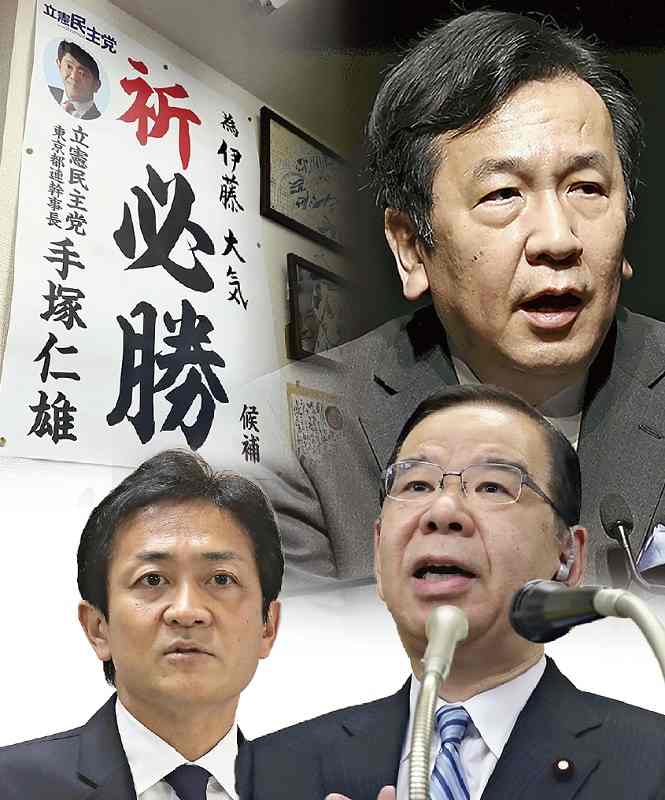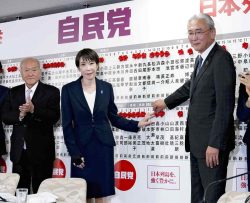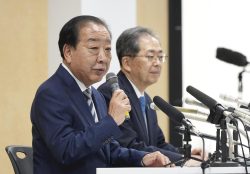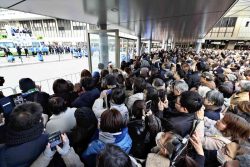
An artist illustration : CDPJ leader Yukio Edano, top, DPFP leader Yuichiro Tamaki, bottom left, and JCP leader Kazuo Shii
13:00 JST, August 17, 2021
Japan’s political parties are making preparations for the House of Representatives election that must be held by autumn. The ruling coalition of the Liberal Democratic Party and Komeito face several internal issues, while the opposition parties search for ways to win more lower house seats. Amid all this, the LDP must also deal with an intraparty presidential vote involving Prime Minister Yoshihide Suga.
This series, Backstories to General Election, is appearing exclusively online on The Japan News. Information is accurate as of the time the series was originally printed in Japanese in The Yomiuri Shimbun in July.
***
As a prelude to the upcoming House of Representatives election, what stood out in the Tokyo metropolitan assembly race was the increasing alignment of the Constitutional Democratic Part of Japan and the Japanese Communist Party.
In early June, CDPJ headquarters was abuzz over a special edition of the party bulletin issued by its campaign office in Tokyo Constituency No. 14. The bulletin ran a transcript of talks between CDPJ member Taketsuka Kimura — a former House of Representatives member who wants to be elected in the district again — and a JCP metropolitan assembly candidate, along with a photo of the meeting under the headline, “Urgent Dialogue.”
CDPJ election campaign committee chairman Hirofumi Hirano summoned Kimura into his office for a tongue-lashing: “What on earth were you thinking?”
“I received the green light from Mr. Tezuka,” Kimura said, name-dropping Yoshio Tezuka, a lower house member and secretary general of the Tokyo chapter of the CDPJ.
Ahead of the assembly race, Tezuka had been calling on members of the Tokyo chapter to support the JCP in their bid for seats in districts where the CDPJ was not fielding candidates of their own.
Tezuka himself participated in a tete-a-tete with Yoshihiko Tanabe, chairman of the JCP’s Tokyo chapter. A JCP-affiliated weekly quoted Tezuka as telling Tanabe during the meeting, “Forging an opposition coalition for the Tokyo [election] would provide significant momentum toward a regime change.”
CDPJ Secretary General Tetsuro Fukuyama phoned Tezuka to complain.
“You have to think about the big picture in the lower house election,” Fukuyama said. “Don’t just do what’s convenient in Tokyo alone.” But the counsel did not stop a ball that was already in motion.
On June 25, the day details of the Tokyo metropolitan assembly election were formally announced, Kimura grabbed a microphone at a campaign rally for the JCP candidate.
“This battle will be fought on a deeper united front between the citizens and opposition parties,” he said from the stump, referring to the JCP candidate as “our hope.”
Posters emblazoned with “Victory,” written by Tezuka in large, bold calligraphy, went up in the offices of some JCP candidates.
Contrary to his usual loquacity, CDPJ leader Yukio Edano equivocates when it comes to relations with the JCP.
“Despite what people say about a ‘united front’ with the opposition, it’s just an alignment [for the election],” Edano said. “We won’t form a coalition with the JCP.”
The CDPJ’s most powerful lobby, the Japanese Trade Union Confederation (Rengo), has a history of horn-locking with the JCP over labor issues. And the CDPJ could lose the conservative vote if seen as cozying up to the JCP, whose party platform calls for abandoning the Japan-U.S. Security Treaty and abolishing the Imperial system.
At the same time, the CDPJ is reluctant to miss out on JCP votes, said to number around 15,000 to 20,000 votes in each single-seat lower house constituency. The effect of the JCP’s sitting out of single-seat constituency races to support CDPJ candidates would be considerable.
Ultimately, in the Tokyo assembly election, the JCP dug deep and won 19 seats, outstripping the 15 seats won by the CDPJ. All four candidates from the Democratic Party for the People (DPFP) lost their races, despite the support of Rengo’s Tokyo chapter.
On July 5, the day after the Tokyo assembly election, Jun Azumi, chairman of the CDPJ’s Diet Affairs Committee, slammed Rengo Tokyo and praised the JCP.
“How many seats did the DPFP win backed by Rengo Tokyo?” Azumi asked rhetorically, adding, “We have to look at what ‘real power’ is.”
Although there had been calls within the CDPJ to take punitive action against Kimura and others who supported the JCP, the pitchforks were put away after the Tokyo election.
“Rengo’s organizational power has been atrophying,” gloated a senior JCP official. “I believe the Tokyo assembly election demonstrated the strength of our [party].”
Unrest among opposition
The alignment between the CDPJ and JCP has created other ripples that are now coming to the fore.
On July 15, Rengo concluded a policy agreement with the CDPJ and DPFP in preparation for the lower house election. Initially, Rengo aimed for a tripartite agreement, but the DPFP balked at the idea, as it did not want the CDPJ to get too chummy with the JCP. As an unorthodox result, copies of the same document were signed individually with each party. A live internet broadcast of the signing was also canceled at the last minute.
In remarks at an agreement signing ceremony, DPFP leader Yuichiro Tamaki pressed Edano, saying: “The CDPJ’s collaboration with the JCP in the Tokyo assembly election created confusion within our own party and at Rengo, as well. I ask the CDPJ for a comprehensive review of what happened.”
But Edano did not respond.
Edano’s influence is on the wane throughout the opposition parties, and he has his sights set on consumption tax.
At a June 15 plenary session of the lower house, Edano abruptly announced a goal “to cut the consumption tax to 5% on a temporary basis.”
Both the DPFP and JCP have been advocating for lower consumption taxes. In early June, a non-partisan study group co-founded by Taro Yamamoto, head of the opposition Reiwa Shinsengumi party, put together their own tax cut proposal.
Although Edano was initially cautious about the consumption tax cut, he seems to have decided that it could be used as a banner to rally the opposition parties
Yet some CDPJ members voiced their confusion at the sudden announcement of the tax cut target, before it could be thoroughly discussed within the party.
Edano had added to the confusion with statements to the effect that “[the consumption tax cut] is not a campaign pledge, but something that will be realized when we take power.”
A source close to the CDPJ expressed disbelief at what they characterized as Edano’s gall in saying he aims to achieve policies through bottom-up politics.
On July 11, Edano visited Oita City and met with Tomiichi Murayama, who served as prime minister in a coalition cabinet led by the Liberal Democratic Party, Murayama’s Social Democratic Party of Japan, and the now-defunct New Party Sakigake.
Edano promised the 97-year-old Murayama that he would create a liberal administration during the former prime minister’s lifetime. But the philosophical foundation and practical framework of such an administration remain nebulous at best.
Top Articles in Politics
-

Japan PM Takaichi’s Cabinet Resigns en Masse
-

Sanae Takaichi Elected 105th Prime Minister of Japan; Keeps All Cabinet Appointees from Previous Term
-

Japan’s Govt to Submit Road Map for Growth Strategy in March, PM Takaichi to Announce in Upcoming Policy Speech
-

LDP Wins Historic Landslide Victory
-

LDP Wins Landslide Victory, Secures Single-party Majority; Ruling Coalition with JIP Poised to Secure Over 300 seats (UPDATE 1)
JN ACCESS RANKING
-

Japan PM Takaichi’s Cabinet Resigns en Masse
-

Japan Institute to Use Domestic Commercial Optical Lattice Clock to Set Japan Standard Time
-

Israeli Ambassador to Japan Speaks about Japan’s Role in the Reconstruction of Gaza
-

Man Infected with Measles Reportedly Dined at Restaurant in Tokyo Station
-

Man Infected with Measles May Have Come in Contact with Many People in Tokyo, Went to Store, Restaurant Around When Symptoms Emerged




















